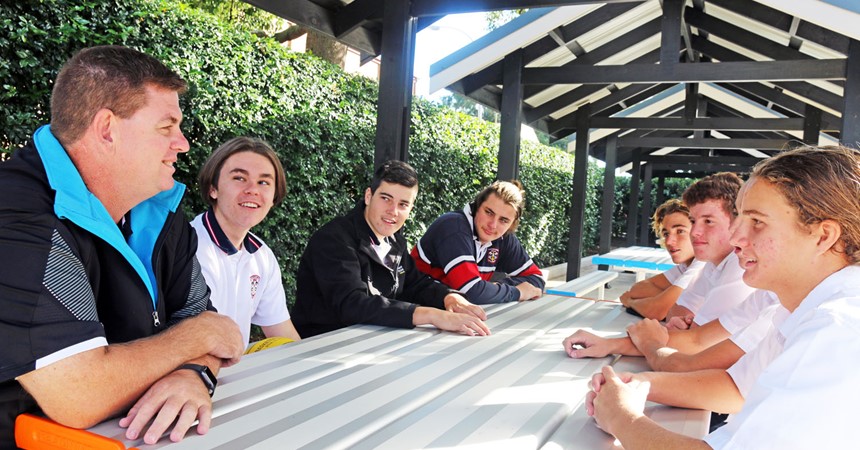Implementing effective wellbeing practices within schools is important to ensure students develop positive relationships with themselves and others, build resilience, and have an enjoyable school experience.
Boys and Relationships is a group offered at All Saints’ College, St Peter’s Campus, Maitland, that aims to provide support in the areas of relationships, anger management and decision-making for male students.
Initiated by the college wellbeing team, the group offers students in stages four and five a place to communicate and participate in hands-on challenges and physical activities.
The group’s 10 members usually meet for an hour once a week over an eight-week period.
Students often find they “feel a strong sense of support and connection to the other boys in the group”, said Kathryn Johnstone, Assistant Principal (Wellbeing) at All Saints’ College.
“It also allows them to access support from staff in a non-confrontational manner. Moving forward, they can then reach out if they need to talk to someone.”
Each week, the group has a different focus, which allows staff to provide a contrasting perspective for the students.
“As a large school, we have a number of boys with differing needs, therefore this group addresses the needs of smaller groups of boys and is a good way to use our resources,” she said.
At St Joseph’s College, Lochinvar, there are a number of wellbeing initiatives and programs for male students.
The Boys Group is a mentoring group for selected male students who require individual support throughout their schooling. The group is run by the college’s male year leaders of learning and provides students with the opportunity to discuss issues or concerns they have.
The Barbecue Crew is another initiative of St Joseph’s, and it provides a more informal mentoring opportunity. The crew allows students and staff to cook breakfast on Friday mornings during the winter season, helping students, particularly boys, build a strong sense of community in a supportive space.
“Students also have access to services such as Beyond Blue, Lifeline, Headspace or other provided activities and opportunities including meditation, yoga and mindfulness,” said Assistant Principal, David Crawford.
“In 2019, we appointed a leader of wellbeing whose role is to promote the wellbeing of all members of our community.
“We have a wellbeing component of our pastoral framework that assists in identifying appropriate wellbeing support levels, services and opportunities for students.
“Our learning mentor groups meet each morning where students have the opportunity to ‘check in’ for their wellbeing each day.”
At St Catherine’s Catholic College, Singleton, male students are part of the LiveRESPECT coaching program.
Developed in the United States by the A Call to Men organisation, the program aims to challenge harmful cultural and social norms and empower boys to make decisions that are better for themselves and those around them.
The program runs once a week and is facilitated by members of the counselling team from the Catholic Schools Office, with the initial group made up of boys from Year 9.
During the program, participants complete a number of activities that focus on student mental health and wellbeing in the school environment.
For example, the group focused on "how can young males break out of the man box" by creating their own “man box” that contains the participant’s definitions of manhood. The aim of the exercise was to break the cycle that prevents young males from becoming healthy men and experiencing healthy relationships.
“Student wellbeing is paramount for young men and women as they transition to adulthood,” said Geoffrey Morley, Professional Officer (Psychologist) at the Catholic Schools Office.
“Wellbeing is a prerequisite for positive relationships, feelings of autonomy and purpose, and resilience now and in the future. LiveRESPECT is a program that has the potential to change the behaviour of males towards females and, in so doing, improve the wellbeing of both males and females as they mature into adults.”
To find out more about student health and wellbeing within our schools, click here.




























































































